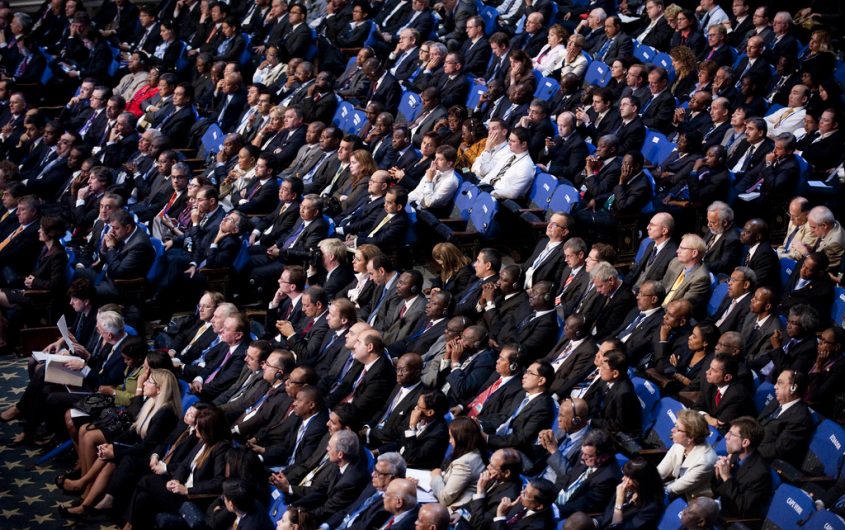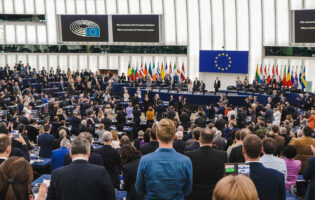
Ryan Rayburn/World Bank via Flickr
Stop Talking about Saving the Transatlantic Relationship and Bretton Woods Order

Andrew Bishop
Signum Global Advisors
Andrew D. Bishop is an established political analyst with a ten-year track record of advising companies, investors, and governments on political risks in developed, emerging, and frontier markets. He currently serves as Partner, Global Head of Policy Research, and head of the Washington, DC, office for a boutique policy consultancy named Signum Global Advisers, where he works closely with clients to address their questions about critical political uncertainties. Andrew joined Signum from Eurasia Group where he served as Deputy Head of Research and was also a Director in the firm’s Global Macro practice. Prior to that, Andrew was a senior manager in the World Economic Forum’s strategic foresight and risk analysis unit. Andrew is a master’s graduate of the London School of Economics and SciencesPo. Paris and was a fellow at the Johns Hopkins University in Washington, DC. He is a Term Member of the Council on Foreign Relations and part of the Munich Security Conference’s leadership program.
He is a 2018-2019 participant in AICGS’ project “A German-American Dialogue of the Next Generation: Global Responsibility, Joint Engagement,” sponsored by the Transatlantik-Programm der Bundesrepublik Deutschland aus Mitteln des European Recovery Program (ERP) des Bundesministeriums für Wirtschaft und Energie (BMWi).
Elite-minded liberals on both sides of the Atlantic—myself included—have often made the mistake of wondering “how to save the transatlantic, Bretton Woods order?” For all its good intentions, this is a narrow-sighted way of looking at the world’s contemporary governance problem, for several reasons.
First, it is reactionary: by defining the issue as being about “hanging on” to the Bretton Woods order, we risk appearing like a camp that roots for sclerosis. Second, it is exclusionary: by calling the Bretton Woods order a Western, transatlantic one, we are de facto preventing the very partners whose help we will need from joining in a collective effort to uphold key governance principles. Third, the goal of striving to uphold the Bretton Woods order is possibly ill-conceived: are we even sure we should so badly want to keep it in place? After all, seventy years in, surely the post-WWII governance framework has some wrinkles worth ironing out.
By calling the Bretton Woods order a Western, transatlantic one, we are de facto preventing the very partners whose help we will need from joining in a collective effort to uphold key governance principles.
Instead of rushing to salvage an order we may or may not need going forward, we would do better to take a step back and ask ourselves what principles we want to defend in this day and age, and what goals we are trying to achieve. By thinking in these terms, we may realize that large parts of the Bretton Woods framework that have long been contested by emerging powers can indeed be revised to accommodate these new actors’ growing demands. We may also discover that we could make quantum leaps in garnering support for our goals if only we agreed to be more flexible when it comes to “branding” the world’s governance architecture. After all, what’s in a name?
Finally, rethinking the Bretton Woods order from scratch may lead us to realize that today’s world possibly does not need institutions in the same way that yesterday’s did. What we need are foras and communication channels; whether discussions take place inside a UN building on the banks of the East River or through newly-minted avenues should matter very little. At present, we are headed toward a world with institutions but no dialogue. I would much prefer we prepared a world with dialogue, even if one short of institutions.
How does all this tie into the transatlantic relationship? First, because, as mentioned above, if one of the transatlantic relationship’s goals is to protect the liberal values that have long defined that relationship, emphasizing their transatlantic nature may actually be counter-productive. Second, because it would be wrong to assume that both sides of the Atlantic still share the same outlook on these matters—something that has become evident over the past few years, but which for some reason still hasn’t led to any serious rethinking exercise. Finally, because we need to take a moment to realize that, just as the U.S. and Europe may no longer share as much as they used to, populations within countries on both sides of the Atlantic have also become dispirited with the traditional, liberal, transatlantic “way of doing business,” and we must reflect on that before taking any other steps.









